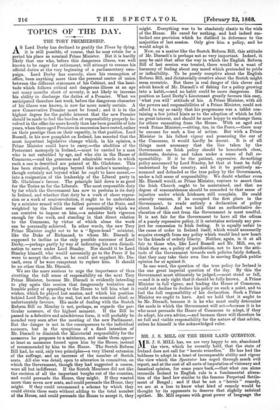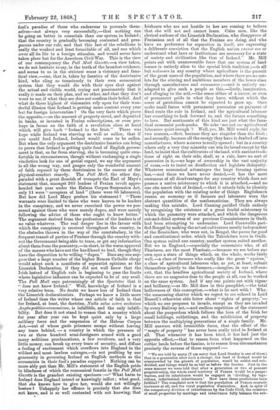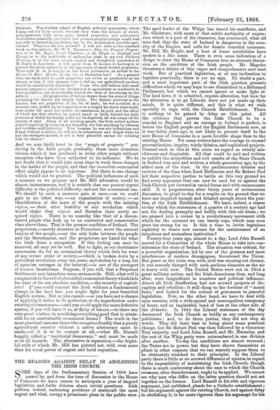MR J S MILL ON THE IRISH LAND QUESTION.
I, 4R. J. S. MILL has, we are very happy to see, abandoned 1.11 the view, which he recently held, that the state of Ireland does not call for " heroic remedies." He has had the boldness to adopt in a tract of incomparable ability and vigour the view which the Spectator has urged through much evil report, and at the cost of all sorts of imputation of visionary and fanatical opinion, for some years back,—that what can alone reconcile Ireland to English rule is a fundamental altera- tion of the land law similar to the famous Perpetual Settle- ment of Bengal ; and if that be not a "heroic " remedy, we are at a loss to know what kind of remedy would be thought by its opponents to deserve that slightly satirical epithet. Mr. Mill exposes with great power of language the fool's paradise of those who endeavour to persuade them- selves—not always very successfully,—that nothing can Be going on better in essentials than our system in Ireland ; that the country is gradually becoming contented and pros- perous under our rule, and that this last of the rebellions is really the weakest and least formidable of all, and one which owes all its life to a foreign stimulus, and would never have taken place but for the American Civil War. This is the view of our contemporary the Pall Mall Gazette,—a view taken, we do not hesitate to say, in the teeth of the broadest evidence, and seems to us in the strictest sense a visionary and fana- tical view,—one, that is, taken by fanatics of the doctrinaire kind, who cling so tenaciously to their own economical system that they would die with their eyes shut against the actual and visible world, crying out passionately that it really is made on their plan, and no other, and that they don't want to see, if what they see does not confirm their belief. And what do these highest of visionaries rely upon for their won- derful illusion that Ireland is getting more content every year but for foreign intervention ? On the very facts which prove the opposite,—on the amount of property saved, and deposited in banks, or invested in Fenian subscriptions, or even per- haps in farms on the faith of a revolution close at hand which will give back " Ireland to the Irish." There was hope while Ireland was starving as well as sullen, that if you could feed Ireland, Ireland would cease to be sullen. But when the only argument the doctrinaire fanatics can bring to prove that Ireland is getting quite fond of English govern- ment is that, so far from starving, she is becoming quite com- fortable in circumstances, though without exchanging a single vindictive look for one of genial regard, we say the argument is all the wrong way, and gauges only the wonderful amount of faith reposed by these doctrinaires in the success of the physical-comfort remedy. The Pall Mall, the other day, paraded with a great flourish of trumpets the Earl of Mayo's statement that, amongst 265 leaders of Fenian revolt appre- hended last year under the Habeas Corpus Suspension Act, only 11 were " occupiers of land " (there were 66 labourers). But how did Lord Mayo preface his statement ? " These warrants were limited to those who were known to be leaders in the conspiracy, and we never exercised the power we pos- sessed against those who were merely dupes, and were merely following the advice of those who ought to know better." The argument derived from the professions of the leaders is of no value whatever. The real danger lies in the favour with which the conspiracy is received throughout the country, in the obstacles thrown in the way of the constabulary, in the frequent transit of parties of Fenians through the country with- out the Government being able to trace, or get any information .about them from the peasantry,—in short, in the warm approval of the masses who have not the hardihood to lead, though they have the disposition to be willing "dupes." Does any one sup- pose that a large number of the higher Roman Catholic clergy would adopt such a manifesto of separatist opinions as the Limerick Declaration, if they did not well know that the Irish hatred of English rule is beginning to pass the limits where legislative influence can be expected to be of any avail. The Pall Mall says patronizingly of the Spectator that it -" does not know Ireland." Well, knowledge of Ireland is a very relative term. No doubt we know less of Ireland than the Limerick declarationists. Perhaps we know a little more of Ireland than the writer whose one article of faith is that for Ireland, at least, the doctrine, Nulla salus extra ecclesiam Auglo-politico-econoinicam, is infallible, and the only infalli- bility. But does it not stand to reason that a country which for year after year can be kept quiet only by a large military force and the suspension of the Habeas Corpus Act,--out of whose gaols prisoners escape without leaving any trace behind, — a country in which the presence of two or three hundred semi-foreigners armed with a good many seditious proclamations, a few revolvers, and a very little money, can break up every trace of security, and diffuse a feeling of excitement which overflows into England in the wildest and most lawless outrages,—is not profiting by our generosity in governing Ireland on English methods as the economists in their fool's paradise suppose ? Nothing can be more ably put than Mr. Mill's statement of the English pride in blindness of which the economical fanatic in the Pall ;Mall Gazette is the grandest existing specimen :—" What harm to Ireland does England intend or knowingly inflict ; what good, that she knows how to give her, would she not willingly bestow I Unhappily her offence is precisely that she does not know, and is so well contented with not knowing, that Irishmen who are not hostile to her are coming to believe that she will not and cannot learn. Calm men, like the clerical authors of the Limerick Declaration, who disapprove of Fenianism and of all that the Fenians are doing, and who have no preference for separation in itself, are expressing a deliberate conviction that the English nation cannot see or understand what laws or institutions are necessary for a state of society and civilization like that of Ireland." Mr. Mill points out with unanswerable force that our system of land tenure is entirely alien to the special Irish tradition ;—is all but unknown in any country where agriculture is the pursuit of the great mass of the population, and where there are no out- lets for the stirring and ambitious members of the lower class through manufactures and commerce ;—and is entirely un- adapted to give such a people as this,—lively, imaginative, and clinging to the soil,—the sense either of a career, or even of permanent pride in what they have, without which the sense of patriotism cannot be expected to grow up. Once make small farms with permanent possession on payment of fixed rents the rule in Ireland, and the agricultural labourer has something to look forward to, and the farmer something to love. But sentiments of this kind are just what the fana- tical economist pooh-poohs. He asks are not our agricultural labourers quiet enough '? Well, yes, Mr. Mill would reply, for two reasons,—first, because they are stupider than the Irish ; and secondly, because all the energy they have is drafted off into manufactures, where a career is really opened ; but in a country where only a very tiny minority can win its bread except by the land, to insist that the cultivators of the land, with ancient tradi- tions of right on their side, shall, as a rule, have no sort of possession in it,—no hope of ownership in the vast majority of cases,—is to insist on disaffection and legislate disloyalty. Whatever economical advantages the large farming system has,—and these we have never denied,—it has the most enormous of all disadvantages for any country which does not possess a native aristocracy to which it is attached,—and no one can assert this of Ireland,—that it utterly fails to identify the population with the existing order of things. Englishmen reason on economy as if farmers and labourers were the abstract quantities of the mathematician. They are always making this mistake. Lord Canning pacified Oudh entirely by recognizing the existence of a great feudal aristocracy to which the peasantry were attached, and which the dangerous cut-and-dried system of our previous Commissioners in Oudh had been attempting to undermine. Lord Cornwallis paci- fied Bengal by making the actual cultivators mostly independent of the Zemindars, who were not, in Bengal, the power for good and constitutional order, which the Talookdars were in Oudh. One system suited one country, another system suited another. But we in England,—especially the economists who, of all Pharisees, are the most Pharisaic,—because we see before our own eyes a state of things which, on the whole, works fairly well,—a class of farmers who really like the great " squires," a class of agricultural labourers who, as yet, at least, submit themselves quietly to the farmers,—imagine, in our self-con- ceit, that the headless agricultural society of Ireland, where there are no magnates dear to the people at all, can be worked on the same system. And if any one points out with vigour and brillancy,—as Mr. Mill does in this pamphlet,—the total hollowness of this conception,—what is he met with ? Why, the unmeaning chatter which we regret to see echoed in Lord Russell's otherwise able letter about " rights of property,"— which no one proposes to invade, except as they are invaded by every Railway act,—and endless repetition of the statement about the pauperdom which follows the love of the Irish for small holdings, sublettings, and the subdivision of property between the multiplying generations of a single family. Mr. Mill answers with irresistible force, that the effect of the "magic of property " has never been really tried in Ireland at all. That whenever it has been tried, it has had just the opposite effect,—that to reason from what happened on the cottier lands before the famine, is to reason from circumstances precisely the reverse of those supposed :- " We are told by many (I am sorry that Lord Stanley is one of them) that in a generation after such a change, the land of Ireland would be overcrowded by the growth of population, would be sublet and sub- divided, and things would be as bad as before the famine. Just in the same manner we were told that after a generation or two of peasant proprietorship, the whole rural territory of France would be a pauper• warren, and its inhabitants would be engaged in 'dividing, by loga- rithms infinitesimal inheritances.' How have these predictions been fulfilled ? The complaint now is that the population of France scarcely increases at all, and the rural population diminishes. And, in spite of the compulsory division of inheritances by the Code Civil, the reunions of small properties by marriage and inheritance fully balance the sub- divisions. The obsolete school of English political economists, whom I may call the Tory school, because they were the friends of entail, primogeniture, high rents, great landed properties, and aristocratic institutions generally, predicted that peasant proprietorships would lead not only to excessive population, but to the wretchedest possible agri- culture. What has the fact proved ? I will not refer to the standard work on this subject, Mr. W. T. Thornton's Plea for Peasant Proprie- tors, or to Mr. Kay's Social Condition of the People in England and Europe, or to the multitude of authorities cited in my own Political Economy, or to the more recent careful and thoughtful researches of M. Emile de Laveleye. I will quote from M. Leona, do Lavergne, at present the stock authority of the opponents of small landed properties. What says M. de Lavergne in his latest production, an article in the Revue des Deux Mondes of the 1st of December last ? ' As a general rule, the lands held in small properties are twice as productive as the others, so that if this element were to fail us, our agricultural produce -would be considerably diminished.' Those who still believe that small peasant properties are either detrimental to agriculture or conducive to over-population, are discreditably behind the state of knowledge on the
subject All prognostics of failure drawn from the state of things preceding the famine are simply futile. The farmer, previous to the famine, was not proprietor of his bit of land ; he was a cottier, at a nominal rent, puffed up by competition to a height far above what could, oven under the most favourable circumstances, be paid, and the effect of which was that whether he gained much or little, beyond the daily potatoes of which his family could not be deprived, all was swept off for arrears of rent. Alone of all working people, the Irish cottier neither gained anything by industry and frugality, nor lost anything by idleness and reckless multiplication. That because he was not industrious and frugal without a motive, he will not be industrious and frugal when he has the strongest motive, is not a very plausible excuse for refusing him tho chance."
And we may fairly trust to the " magic of property " pro- ducing in the Irish people, gradually, those same economic virtues which it has produced in every other people without exception who have been subjected to its influence. We do not doubt that it would take some time to work these changes in the habits of the people, and that the immediate economical effect might appear to be injurious. But there is one change which would not be gradual. The political influences of such a measure as we propose and Mr. Mill advocates, would be almost instantaneous, and it is notable that our present urgent difficulty is the political difficulty, and not the economical one. We should by such a measure gain at once,—as we could gain in no other way, — an organization of society, — an identification of the mass of the people with the existing regime, — their utter hostility to any revolution which would shake that regime and threaten their newly ac- quired rights. There is no anarchy like that of a discon- tented people who look up to no contented and conservative class above them. That is the present condition of Ireland. The proprietors,—mostly absentee or Protestant, never the natural leaders of the people,—are the only links between the people and the Government, and the proprietors are hated for what the Irish deem a usurpation. If this feeling can once be removed, all may yet be well. But to fight, as our doctrinaire economists do, for an economical theory which fails for want of any secure order of society,—which is broken down by a periodical revolution every ten years, and shaken by a long list of agrarian outrages in the interval,—is one of the strangest of human fanaticisms. Suppose, if you will, that a Perpetual Settlement may introduce some serious evils. Still, what evil is comparable to the evil of a beautiful economical theory which fails for want of its one absolute condition,—the security of capital- ists ? If you could content the Irish without a fundamental change in the land law, you might fight for your beautiful English system. But as you cannot,—as you have not a chance of applying it either in its perfection or its imperfection under existing circumstances,—and you could apply the more defective system, if you will have it so, of fixity of tenure,—is there any very great wisdom in sacrificing everything good that is attain- able for an unattainable economical dream ? The truth is, the most practical men are those who recognize frankly that a purely agricultural country without a native aristocracy must be made,—if it is to be content at all,—what Mr. Disraeli happily called a " territorial democracy," and must be made so at all hazards. The alternative is separation,—the fright- ful evils of which Mr. Mill has pointed out, with even more than his usual power of cogent and lucid exposition.




































 Previous page
Previous page